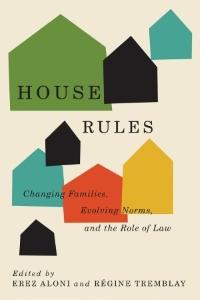
Globally, the number of cohabitating couples is on the rise. And according to the latest census, 23 percent of couples in Canada who live together are unmarried – the highest proportion of common law relationships among all G7 countries.
Allard Law professor and family law scholar Erez Aloni says there’s a good chance that many cohabitating couples in Canada don’t fully understand their legal obligations to one another – and that the law in BC and other provinces may not match some couples’ expectations.
Since 2013, under BC’s Family Law Act, couples who have lived together in a ‘marriage-like’ relationship for at least two years are obligated to share any debts or assets accumulated during the relationship in the event of a breakup. Former partners can also be required to pay spousal support. Couples who live together but don’t want the law to apply to them need to create and sign a contract to legally opt out. Alberta, Manitoba, Saskatchewan and the Northwest Territories have similar rules.

“The law is designed to protect the primary caregiver in the family – typically women – who have given up a lot for the prosperity of the entire household,” Aloni explains. But while the law is not without benefits, Aloni says lawmakers should take a second look at whether the law is out of sync with the realities of many Canadians.
Surprise, you’re married
To better understand how cohabitating couples navigate BC’s opt-out system, Aloni spoke with 30 unmarried couples about why they choose to live together and to what extent they understood the legal implications. He found that most couples either didn’t know they were in a common law relationship or were aware but misunderstood the law.
“The majority of the couples were completely ignorant about the law. Others, highly educated, capable people, took days trying to understand it,” says Aloni. “Even after that, many still didn’t realize what their obligations were or that they could opt out – they just assumed these are mandatory obligations, and there's no way out.”
The law is grounded in strong justifications, but the assumption it’s good for women has been overgeneralized.
After couples learned about the law, Aloni found that only half were comfortable with their obligations. One woman he spoke with was dismayed to learn she would be liable for her partner’s student loan debt that had accumulated during their relationship if they were to ever break up.
“The law is grounded in strong justifications, but the assumption it’s good for women has been overgeneralized,” Aloni says, and may run up against the wishes of women with low income who have intentionally avoided marriage specifically to protect themselves from being held responsible for a partner’s debt.
What’s law got to do with it?
BC’s Family Law Act was introduced to reduce the need for litigation by clarifying that partners who are in a ‘marriage-like relationship’ for at least two years have the same rights and obligations as married couples. But so far, the law hasn’t had the intended effect. “Now people just often contest the fact that they were in a marriage-like relationship,” Aloni notes.
The couples he spoke with agreed their relationships were “marriage-like,” but their definitions of what that meant varied drastically – from having to wait to watch the next Netflix episode to feelings of love and the expectation of commitment. Regardless of their definitions, half of couples said they didn’t want the law to impose financial obligations.
In the end, most couples in BC are married – whether by ceremony or by default. What choice does it leave couples who want to organize their lives differently?
Aloni also found that couples moved in together for reasons other than love and commitment. In speaking with couples, Aloni encountered the term WAR – that’s Whistler-Accelerated Relationship. “Apparently, people in Whistler are moving in together so quickly because of the housing affordability problem that there’s an acronym for it,” he explains.
Lawmakers need to keep in mind that laws can actually perpetuate outdated social norms, Aloni says, and the assumption that cohabiting couples are committed for the long term or that one partner is the breadwinner and the other plays a support role clearly doesn’t work for everyone. “We have this law where in most cases people who live together for two years are deemed to be de facto married,” says Aloni. “We need to ask ourselves, what norm does that communicate? In the end, most couples in BC are married – whether by ceremony or by default. What choice does it leave couples who want to organize their lives differently?”
Changes are needed to make the Family Law Act better reflect changing social norms and help couples determine their own obligations, Aloni argues. First, the government needs to do a better job of informing people about the law. “If the idea is that couples can opt out, let people know!”
Second, opting out is too difficult. The few couples in his study who tried to opt out said they couldn’t afford a lawyer or didn’t understand how to properly enter into an agreement. “There are creative ways to make it easier,” Aloni says, such as providing a template contract or an app that helps people choose which obligations should apply to them. “That can help couples decide what they want to happen, before things turn acrimonious.”


